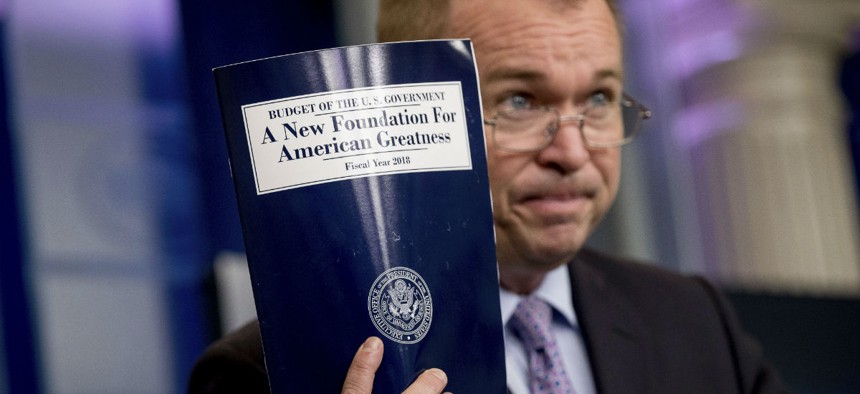Agency Leaders Backtrack From Some of Trump’s Proposed Budget Cuts
Officials say they'll work with Congress to save some programs Trump wants to eliminate.
During questioning by members of Congress this week on the Agriculture Department's budget proposals to cut research funding, Secretary Sonny Perdue conceded it was “one of those areas where we may have missed the mark.”
Sen. Tom Udall, D-N.M., asked Perdue if he would support conservation, rural development and research programs “notwithstanding the president’s budget.” Perdue's response: he would, in New Mexico and “the other 49 states as well.”
Perdue is one of several agency leaders in the Trump administration who have backed off of some of the most drastic cuts in the president’s fiscal 2018 budget blueprint, which would slash $54 billion in discretionary spending at non-defense agencies. In some cases, the officials appeared to be acquiescing to pushback from lawmakers, acknowledging congressional appropriators would ultimately assert their will over the White House’s wish list. In other cases, the agency chiefs willingly admitted the administration had erred from the get-go.
Perdue went on to promise lawmakers he would “work to right-size the budget,” particularly on agricultural research. On Thursday, he told Government Executive’s sister site, Route Fifty, that President Trump was committed to rural development despite cutting staffing to the Rural Development office and eliminating funding for the Appalachian Regional Commission, among other programs.
“We’ll see where we come out,” Perdue said. “Rural development I can assure you, from his perspective, is very important. Watch and see.”
In another hearing this week, Veterans Affairs Department Secretary David Shulkin completely retreated from a proposed cut in his budget. Trump's budget proposal would eliminate a benefit for veterans unable to work due to service-related injuries once they become eligible for Social Security. The proposal was met with significant pushback from lawmakers and veterans groups alike.
“What I'd like to say is that this is part of a process,” Shulkin said. “We have to be looking at ways to do things better, but I am not going to support policies that hurt veterans.” The secretary added it “became clear” after the budget came out that the provision would do exactly that.
At a hearing on her agency’s budget, Transportation Department Secretary Elaine Chao told lawmakers she would be willing to let survive some popular programs that the White House had slated for elimination.
“We’re willing to work with you,” Chao said of programs such as Transportation Investment Generating Economic Recovery (TIGER). “This is a very popular program. Members of Congress like it. And so we will respond to the will of Congress.”
Last week, as he faced questioning from lawmakers on proposed cuts, Interior Department Secretary Ryan Zinke said the budget was just a “starting point.” Earlier this year, before the final budget numbers came out, Zinke reportedly told employees he was “not happy” with the spending levels the administration was floating, “but we’re going to fight about it and I think I’m going to win at the end of the day.”
With the budget being drafted while agencies were still transitioning and lacking much of their political leadership, the Office of Management and Budget took the reins in crafting the document. USDA officials, for example, told lawmakers last month the blueprint came entirely from OMB and the department had little input into the proposals included.
Even Environmental Protection Agency Administrator Scott Pruitt, who at a recent hearing largely defended the proposed massive reductions at his agency that are seen as the hallmark of his nascent leadership, allowed for some wiggle room on the reductions that would transform EPA and slash its workforce. After lawmakers from both parties told the administrator they did not support cuts to Superfund cleanup, Pruitt said the projects were “absolutely a priority.” He vowed to work with Congress to fund them, which he noted “could be an issue” under the administration’s current proposals.
Housing and Urban Development Secretary Ben Carson summed up the attitude of many agency leaders in an exchange with Rep. Nita Lowey, D-N.Y., who was compelling the administration not reduce spending on a lead program. Carson said he was not able to make his budget work by increasing funding for the program further, but if Congress provides more money he would “happily accept” it.
“Well, that’s good news,” Lowey responded.
Lawmakers made clear in some cases that agencies would be getting more money than they requested whether they wanted it or not. Rep. Tom Cole, R-Okla., told Pruitt EPA would not receive “as much as you’ve had, but you will do better than you’ve asked for.” In a hearing with State Department Secretary Rex Tillerson, Sen. Bob Corker, R-Tenn., dismissed the Trump administration’s proposal outright.
“I think you know that the budget that’s been presented is not going to be the budget we’re going to deal with,” Corker said. “It’s just not.”
Bill Lucia contributed to this report.




